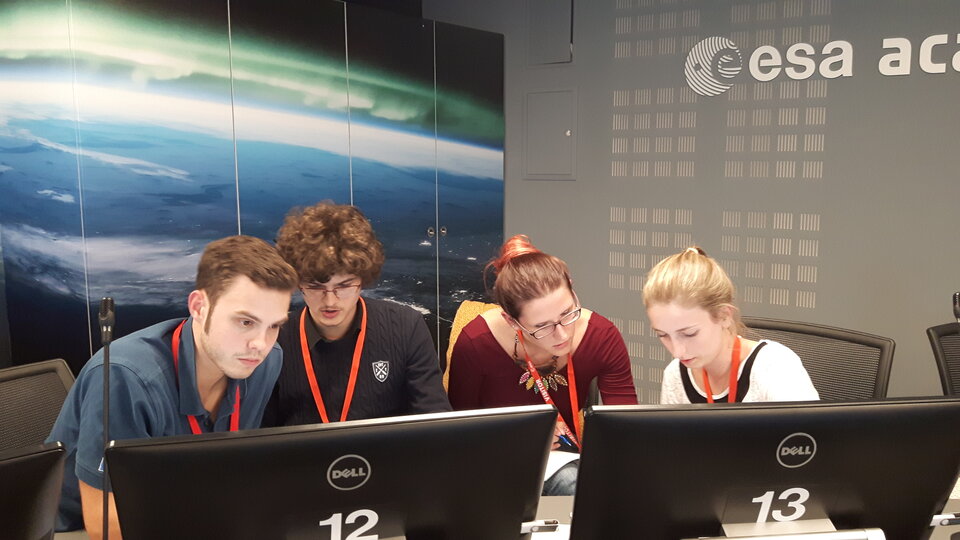Call for applications for the Ladybird Guide to Spacecraft Operations training course
Following the success of the ESA Academy’s Ladybird Guide to Spacecraft Operations training courses in the past two years, ESA’s Education Office is offering 30 university students the opportunity to participate again in this course and learn about the fascinating world of spacecraft operations.
To bring this fascinating world of challenges and satisfaction to life for university students contemplating a career in the space sector, ESA is organising the Ladybird Guide to Spacecraft Operations training course, a technical course without excessive mathematics or technical jargon. This 4-day course will take place between 11 and 14 September 2018 at the ESA Academy’s Training and Learning Facility in ESEC-Galaxia, Transinne, Belgium.
The course will show students how ‘driving’ a spacecraft is different from designing it. When it comes to spacecraft, it is the launch itself that grabs all the headlines. Once in orbit, we only tend to hear about the satellite again when it returns a great result or a spectacular image. But spacecraft do not take care of themselves on their own.
The unsung heroes of any space mission are the people working in operations. They are the ones who work 24/7 to ensure that the spacecraft is healthy, returning the most data, and functioning at peak efficiency. In addition, these are the operators who diagnose problems with satellites and work out how to make them function properly again.

The course is suitable for BSc, Msc and PhD students who want to quickly acquire a feeling for the broad spectrum of disciplines that are part of spacecraft operations.
Taught by an ESA expert from the Advanced Operations Concepts Office of ESA’s European Space Operations Centre (ESOC) in Darmstadt, Germany, the course will be delivered through formal lectures but with a heavy emphasis placed on the interaction with the students.
The way specific sub-systems of a spacecraft like Attitude, Determination and Control Subsystem (ADCS), Orbit Control System (OCS), Power, On Board Data Handling (OBDH), Telemetry, Telecommunication & Control (TT&C) and Thermal and On Board Software (OBS), have been designed has a bearing on the way operations are carried out, and this will be highlighted and discussed. The course will include a session on the physiological traps to be avoided during operations and testing.
Real stories of operational staff battling with wayward spacecraft – sometimes winning and sometimes losing – will be used whenever appropriate. And finally, the participants will take place in a challenge. They will be presented with the operational information received from satellites at the time of a problem. They will have to work out what went wrong and, more importantly, what should be done.

“If you want to really understand how a spacecraft works this is the right course. It goes through all the subsystems in a way that makes you understand the connection between everything on that spacecraft. All in all it is the perfect opportunity for anyone who is interested in working in the space industry,” said an engineering student from Romania who participated in the training course.
A highlight for the students will be a visit to the ESA’s European space Security and Education Centre (ESEC) second site located in Redu. ESEC-Redu is a ground station featuring antennae and operations rooms, where students will get to see spacecraft operations with their own eyes while visiting the PROBA spacecraft’s operations room and will meet ESA’s operations engineers.
Preliminary schedule:
| Day 1 & 2 |
Introduction - the difference between design and operations engineers Mission design and payloads Attitude Dynamic and Control Subsystems Orbit Control System PowerGroup Exercise |
| Day 3 & 4 |
Power (Storage)Thermal Telemetry-Tracking and Control Subsystems Command and ControlOn-board processors On-board software and Fault Detection, Isolation and Recovery Group Exercise and Summary |
The selected students will be sponsored by ESA. The sponsorship will cover accommodation and meals as well as up to 200 euros for travelling to Belgium.
The deadline for applications is 27 July 2018 23:59pm CET.
Additional Information
Who can apply?
Students enrolled in university who meet the following criteria:
- be aged between 18 and 32;
- be a citizen of an ESA Member or Associate State;
- be enrolled as a full-time Bachelor, Master, or PhD student in a university for the year 2018-2019;
- be studying an engineering subject or physics (with basic knowledge in space technology).
How to apply?
- Fill in the application form;
- Upload a motivation letter (PDF, maximum 1 page, no images);
- Upload a CV (PDF, maximum 2 pages);
- Upload a formal recommendation letter (PDF, maximum 1 page, including signature, no images) from a university professor or an academic supervisor of current university;
- Upload an official copy of academic records (PDF, in English, with the university stamp).
For more information, please contact esa.academy @ esa.int


